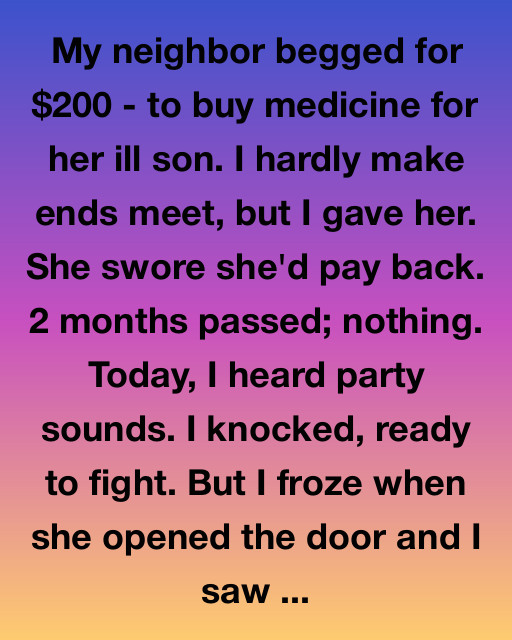One evening, my neighbor appeared at my door—red-eyed, hands trembling—and asked if she could borrow $200. Her little boy needed medicine, she explained, and she was short. I’m barely making it myself—juggling bills, hoping my card doesn’t fail at checkout—but I gave her the money anyway. She promised she’d pay me back soon.
Weeks passed. Then months. Nothing. No knock, no envelope, not even a text. Just silence.
Then, one night, I heard music through the thin walls of our apartment—laughter, children shouting, chairs scraping. A party. My stomach knotted. She couldn’t pay me back, yet she could throw a celebration? Really?
I marched over, rehearsing a speech about trust and respect, about how people like us can’t afford to get burned. But when she opened the door, flushed and startled, all my anger evaporated.
She stepped aside. Her living room was packed with children. Droopy balloons hung from the walls. A crooked cake read: “WELCOME HOME, CALEB” and underneath, “YOU’RE GOING HOME!”
In the corner, a frail boy, hair growing back in uneven tufts, gripped a paper cup like it was the best night of his life. He’d been in the hospital for months, fighting cancer.
Every ounce of anger I carried deflated instantly.
The money I’d lent hadn’t been wasted. It had covered what insurance wouldn’t—medications, chemo, keeping her son alive. The party wasn’t indulgence—it was relief.
She must have seen my face. “I meant to pay you back,” she said, voice shaking. “I just… every time I saved a little, something else happened. His counts dropped. He needed more treatment. I was only thinking about the next appointment.”
I had no smart reply. Just guilt, creeping up my neck.
Then Caleb walked over and hugged me like I was family. “Thank you for helping my mom,” he whispered.
I felt myself shrink.
Later, she came to my door again, holding a slice of cake wrapped in foil and a small envelope. “It’s not the full amount,” she said softly. “But it’s something. I’ll bring the rest next week.”
Inside were a few bills—more than I expected. We sat together on the concrete steps, listening to children playing nearby. She admitted she’d avoided me out of shame, afraid to face me while barely keeping her head above water.
Over the next weeks, she paid the rest in small amounts—twenty here, forty there—always apologizing, though she no longer needed to. By then, the money wasn’t the point. We started really talking—about bills, exhaustion, the constant fear that life kept throwing at us.
We discovered how alike we were: single parents, scraping by, held together with stubbornness and caffeine. She cleaned offices at night and picked up extra shifts. I worked three jobs and still ran on fumes.
Eventually, we began helping each other without thought. I’d watch Caleb when she worked extra shifts. Leftover soup went over to her apartment; she returned my bowl neatly wrapped. She fixed my screen door latch, gave rides, and shared time and effort—currencies far richer than cash.
Our building slowly transformed from a stack of strangers into a quiet, connected community.
One night, after Caleb went to bed, she approached me nervously. “I want to start my own cleaning business,” she said. She already had a few regular clients. “Would you… help me with the website? You’re good with computers.”
“Good with computers” was generous, but I’d built a simple food truck site once—good enough.
For three weekends, we huddled over my glitchy laptop, fighting spinning loading icons like demons, drinking terrible coffee. She named the business “Second Chance Cleaning.” “For Caleb,” she said. “For both of us. For anyone who needs a fresh start.”
The site was simple, honest, and functional. At first, inquiries were few, but she hustled. Handing out flyers, asking for referrals, showing up early, leaving late. Within months, demand exploded. She hired two other single moms from our complex. Together, they rotated childcare and shifts. The building felt connected.
One client, Mrs. Alvarez, noticed the organized scheduling. “Who handles your paperwork?” she asked.
“My neighbor,” she said proudly.
A week later, Mrs. Alvarez offered me part-time administrative work managing her rentals. It paid more than two of my jobs combined. I said yes before I even thought.
Life didn’t magically become easy, but it shifted. I could breathe a little. Caleb got a secondhand bike. I fixed a leaky faucet I’d ignored for a year. Then a young couple moved in, exhausted with a newborn. I helped them like my neighbor had helped me—babysitting, warm meals, guidance.
Almost a year after loaning that shaky $200, she called, voice trembling with excitement. She’d won a women-owned business grant: $15,000. She reinvested in her business and came to my door with an envelope.
Inside was a check for $2,000.
“You already paid me back,” I said.
“This isn’t repayment,” she said. “It’s partnership. I want you to build websites for people like us—those starting from scratch. We can help each other grow.”
I was stunned. That $200 I’d lent, trembling, had returned to me a hundredfold—not in cash alone, but in community, friendship, and shared growth.
I almost missed it because I assumed the worst.
Here’s the truth: people vanish for reasons you can’t see—shame, fear, survival. Sometimes what seems like betrayal is just someone barely hanging on.
Give what you can. Protect yourself, yes, but don’t harden so nothing can get through—not help, not grace, not the unexpected growth from small acts of kindness.
Sometimes, the return just takes the long way around.
